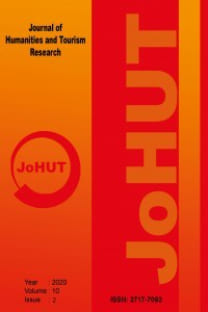Propaganda Activities and British Special Operations Executive’s Political Influence Actions in Romania between 1941-1944
Anahtar Kelimeler:
-
Propaganda Activities and British Special Operations Executive’s Political Influence Actions in Romania between 1941-1944
Propaganda represents a powerful war weapon. In this respect, its goal was to dehumanize and to produce hatred against a supposed enemy. The techique used was to create a false image in the target groups. This can be done by using some special words or avoiding some other words on purpose or asserting that the enemy is responsible for some negative facts. The war propaganda implies the fact that the population perceives the enemy as making something unjust, this asertion being based on real facts or on the fiction created by the propaganda specialists. The sophisticated propaganda from the war agaist some supposed atrocities caused by the enemy represents an effective psychological weapon usually used to enflame soldiers’ mind, making them believe the would fight for a just cause. The enemy becomes some sort of monster by innoculating them with all sorts of supposed attrocities. Mass media repeats endlessly how cruel and demonic the enemy can be. During the Second World War, the allied powers propaganda had an important role to make people believe in the AXA’a s victory, from which Romania was a part. The British ran their propaganda programs through a special organism “British Political Warfare Executive”. The moment the war started, in Romania there was a public opinion oriented exclusively towards Great Britain and France. In spite of the interdictions, the BBC went on to be listened. The British propaganda urged Romania to mobilise against Germany, asking insistently to leave the war, turning the weapons, forming an effective opposition, abolishing the regime, a sabbotage of the German machine war. How much success those operations had, we are going to analyse further on. In special the political influence of this action in Romanian between 1941-1944.
Keywords:
Propaganda, British special influence, Romanian, WWII political influence,
___
- AMAE, fond 71 România, dosar 66, f 187, Notă informativă a SSI din ziua de 13 februarie
- AMAE,, fond 71 România, dosar 365,. Notă SSI din 3 iunie 1940, f. 380.
- Andrei Şiperco, Ministrul Elveţiei la Bucureşti transmite, în Magazin Istoric nr. 11, 1990.
- Arhiva S.R.I., Fond „D”, Dosar 7920. Sinteză informativă SSI din noiembrie 1940, f. 83.
- Arhiva S.R.I., Fond „d”, Dosar 8180, Notă SSI din 15 aprilie 1941, Vol. II, f. 268.
- Arhiva S.R.I., fond „d”, Dosar 8573, Sinteză informativă a SSI din mai 1940, f. 169.
- Arhiva SRI, fond d, dosar 8180, vol 5, Notă informativă SSI din 21 ianuarie 1942, f. 69.
- Arhivele Naţionale ale României-Arhiva Istorică Centrală, fond microfilme Italia, Rola 61, cadru 85
- F. Constantiniu, „Însemnările unui agent britanic din ajunul insurecţiei române din August
- 1994”, în Revista de Istorie nr. 5-6/1982., p. 737.
- Arhivele Statului din România, România – Marele sacrificat al celui de-al doilea Război Mondial, Bucureşti.
- Biroul pentru războiul politic-organism care se ocupa cu propaganda de război.
- Brestoiu (1991), Memoria Frontului secret. Tranşee ale luptei secrete din România în anii celui de- al doilea Război Mondial, Editura Globus, Bucureşti, Vol. I.
- C. Coposu, „Pagini de jurnal, 1940, Asasinarea profesorului Virgil Madgearu”, în Magazin Istoric nr. 9/1993.
- C. Troncotă, Traian Borcescu, Riscurile jocului dublu, în Magazin Istoric nr. 7/1993.
- E. Barker, (1975), British Policy in South-East Europe in the Second World War, London, Macmillan.
- Eugen Preda, (1976) Săritura de pisică, Editura Militară, Bucureşti.
- F. Constantiniu, „Însemnările unui agent britanic din ajunul insurecţiei române din August 1994”, în Revista de Istorie nr. 5-6/1982.
- G. Troncotă, „Din Istoria S.S.I., Eugen Cristescu despre Eugen Cristescu” în Magazin Istoric nr. 7/1992.
- H. Brestoiu, (1987), O istorie mai puţin obişnuită, Editura Politică, Bucureşti.
- Ivor Porter,( 1991), Operaţiunea Autonomous, Editura Humanitas, Bucureşti.
- Jipa Rotaru, Octavian Burcin, Octavian Zodian, Mareşalul Ion Antonescu, ( 1998 ) Am făcut războiul sfânt împotriva Bolşevismului, Editura Cogito, Oradea, 1994.
- Marcel Dumitru Ciucă, Procesul Mareşalului Antonescu, Documente, Editura Saeculum I.O., Bucureşti, Vol. II.
- Mihail, E. Ionescu, (1984) Puterea Cuvântului. Propaganda mişcării de rezistenţă din România (1940-1944), Editura Ştiinţifică şi Enciclopedică, Bucureşti.
- Nicolae Baciu,( 1999) Agonia României, 1944-1948, Dosarele Secrete acuză, Editura Dacia, Cluj Napoca.
- Paul Quinlan, (1995) Ciocnire deasupra României; politica anglo-americană faţă de România, 1938-1947, Centrul de Studii Româneşti, Fundaţia Culturală Română, Iaşi.
- Troncotă, (1994) Eugen Cristescu Asul serviciilor secrete româneşti, Memorii, Mărturii, Documente., Editura Roza Vânturilor, Bucureşti.
- Troncotă, (1999) Istoria serviciilor secrete române de la Cuza la Ceauşescu, Editura Ion Cristoiu S.A., Bucureşti.
- Universul, 1 februarie 1942.
- V. Fl. Dobrinescu,(1993) Emigraţia română din lumea anglo-saxonă 1939-1945, Institutul European, Iaşi.
- 23 August. Documente, doc 323.
- ISSN: 2717-7092
- Başlangıç: 2010
- Yayıncı: Karabük Üniversitesi
Sayıdaki Diğer Makaleler
Özlem YURT, Esra Ömeroğlu, Şener Büyüköztürk, Yasem KARAYOL
Örgütsel Bağlılık ve İş Tatmini Arasındaki İlişki
Stefan Georgescu, Marian Zidaru - Cristian
Civilization as the Survival of the Weak: Rethinking Evolutionary Theory in Civilizational Context
İlkokul Birinci Sınıf Öğrencilerinin Okula Uyum Düzeylerini Etkileyen Değişkenlerin İncelenmesi
Sibel YOLERİ, Hatice Merve Tanış
Yönetsel Reformlar Perspektifinden Türkiye’de Yönetimin Gelişimi Üzerine Bir İnceleme
